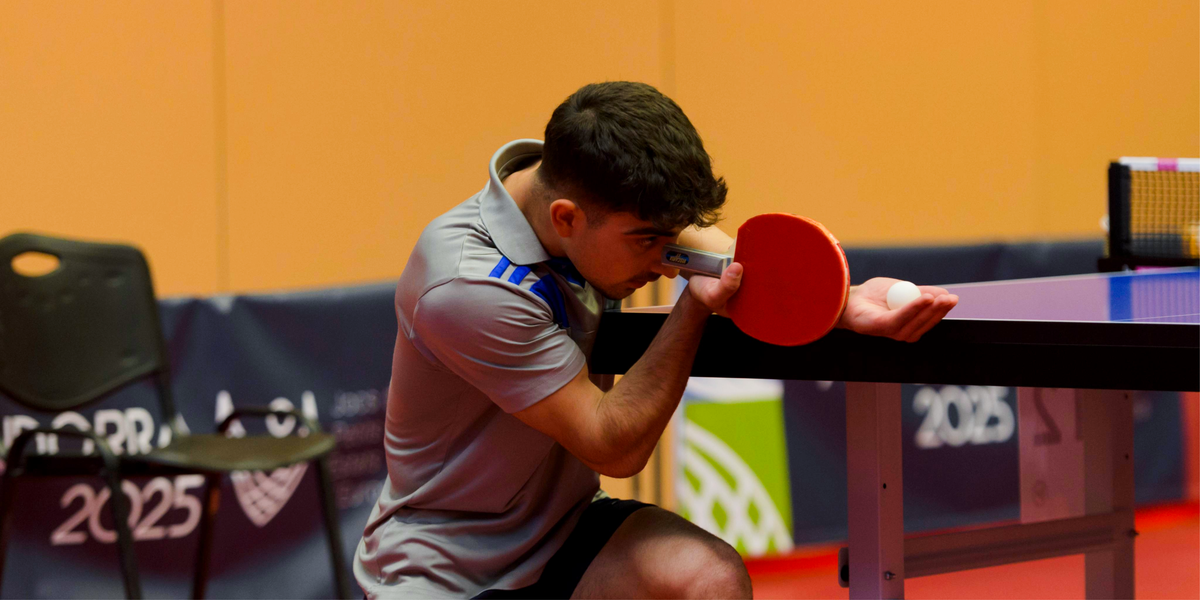Sharpel Elia's Olympic Pursuit
The serve that cost Sharpel Elia precious points at the Games of the Small States of Europe revealed everything about the distance between national dominance and Olympic qualification. In that moment, the 19-year-old Cypriot discovered the brutal mathematics of international table tennis.

The Precision Project
The serve that cost Sharpel Elia precious points at the Games of the Small States of Europe revealed everything about the distance between national dominance and Olympic qualification. In that moment, facing opponents who could punish imprecise placement and exploit limited spin variation, the 19-year-old Cypriot discovered the brutal mathematics of international table tennis: margins shrink as stakes rise.
Three months later, Elia dissects that revelation with the analytical precision his sport demands. "At the national level, I can often rely on my strengths to dominate," he explains, "but internationally, every opponent is strong, well-prepared, and able to punish even small mistakes." The silver medal in doubles at Andorra marked both achievement and education—proof of his emerging international capability alongside stark evidence of the technical refinement required for Los Angeles 2028.
The Seven-Year-Old's Promise
Elia's Olympic ambition traces to an instant connection forged at age seven. Unlike the manufactured origin stories common in youth sports, his discovery of table tennis carried genuine inevitability. "From the very first time I stepped to the table, I felt an instant connection with the sport," he recalls. "The speed, precision, and endless possibilities for improvement captured me."
That initial attraction has matured into methodical obsession. The child drawn to speed and precision now understands these elements as technical challenges requiring systematic development. His recent focus on serve variation and forehand reliability reflects this evolution—moving from intuitive play to calculated improvement targeting specific competitive deficiencies.
The transformation reveals itself in his relationship with pressure. Where the seven-year-old experienced pure enjoyment without competitive burden, the current Elia faces "the urgency to perform" that accompanies international representation. Rather than lamenting this shift, he frames pressure as developmental necessity: "I'm learning to manage that pressure and use it as motivation rather than letting it hold me back."
The Technical Gap
Elia's assessment of his international debut exposes the precise challenges facing emerging Olympic hopefuls. His identification of serve limitations and forehand inconsistency under pressure demonstrates the analytical approach required for elite development. These technical deficiencies, invisible against national competition, became glaring vulnerabilities against international opponents who could exploit every weakness.
The solution involves reconstructing fundamental elements most players consider finished products. Elia now dedicates training time to serve placement and spin variation—skills typically mastered in junior development but requiring Olympic-level refinement. Similarly, his forehand reliability project addresses the pressure-induced quality loss that prevents attacking dominance against elite competition.
This technical reconstruction represents the hidden cost of Olympic pursuit. While casual observers see smooth progression from national to international success, reality demands systematic rebuilding of supposedly complete skills. Elia's willingness to deconstruct and improve fundamental techniques signals the intellectual honesty required for genuine elite development.
Mental Architecture
Elia's mental conditioning approach reflects sophisticated understanding of competitive psychology. Rather than abstract resilience training, he creates specific pressure simulations: "I try to simulate match pressure by setting specific goals for drills, like reaching a target number of quality serves or rally points without errors, so I'm forced to stay sharp."
This methodology addresses table tennis's unique psychological demands. The sport's rapid point-to-point transitions leave little time for emotional reset, making mistake management crucial. Elia's focus on maintaining composure after errors—"staying calm when I make mistakes instead of getting frustrated"—targets this specific challenge.
His fatigue training adds another layer of mental preparation. By maintaining performance quality while physically exhausted, he builds the psychological reserves required for extended international matches. This approach recognizes that Olympic qualification demands not just peak performance but sustained excellence under accumulating stress.
The Small Nation Advantage
Cyprus's limited table tennis infrastructure creates both obstacles and opportunities for Olympic development. Elia's dominance in national competition—sweeping U19 and U21 singles titles while earning Best Junior Athlete recognition—established technical fundamentals and competitive confidence. However, this same environment now requires international exposure to continue development.
His international breakthrough at Andorra suggests this foundation provides solid launching point for Olympic pursuit. The doubles silver medal demonstrated his ability to compete effectively at multi-national events while revealing specific areas requiring improvement. This balanced assessment—acknowledging both capability and limitations—indicates mature competitive perspective.
The Cyprus Olympic Committee's recognition of Elia's potential through its Best Junior Athlete award signals institutional support for his Olympic campaign. Such backing becomes crucial for small-nation athletes requiring international competition access and specialized coaching resources.
Legacy Beyond Performance
Elia's Olympic ambition extends beyond personal achievement to sport development within Cyprus. His vision involves using Olympic qualification to "show young players in Cyprus that it's possible to reach the highest level, even coming from a small country." This perspective transforms individual pursuit into broader sporting mission.
Table tennis in Cyprus lacks the visibility and resources of traditional sports, making Elia's potential Olympic appearance particularly significant. His platform would provide proof of concept for aspiring players while potentially attracting increased participation and investment. The combination of personal validation and community impact creates compelling motivation structure for sustained elite pursuit.
His planned engagement through training camps and school visits demonstrates understanding of athlete platform responsibility. Rather than viewing inspiration as byproduct of success, he positions it as integral component of his Olympic mission.
The Los Angeles Timeline
The 2028 Olympics provide defined target for Elia's development project. His current international ranking and recent competitive results suggest realistic qualification pathway exists, though significant improvement remains necessary. The technical refinement project he has initiated—focusing on serve variation and forehand reliability—addresses precisely the areas exposed by international competition.
His analytical approach to weakness identification and systematic improvement suggests the intellectual framework required for Olympic-level development. The willingness to deconstruct fundamental skills and rebuild them under pressure demonstrates competitive maturity often missing in young athletes.
The three-year timeline to Los Angeles allows sufficient development period while maintaining urgency. Elia's current trajectory—national dominance transitioning to international competitiveness—positions him well for sustained improvement toward Olympic qualification standards.
Measured Optimism
Elia's Olympic pursuit represents the intersection of genuine talent, systematic development, and realistic assessment of challenges ahead. His identification of specific technical limitations, combined with methodical approach to addressing them, suggests the analytical capabilities required for elite development.
The path from Cypriot champion to Olympic qualifier remains demanding, requiring sustained improvement across technical, physical, and mental dimensions. However, Elia's demonstrated ability to learn from international competition while maintaining competitive confidence provides foundation for continued development.
His vision of personal achievement serving broader sporting mission in Cyprus adds compelling dimension to conventional Olympic pursuit narrative. The combination of individual ambition and community impact creates sustainable motivation structure for the demanding years ahead.
The seven-year-old's instant connection with table tennis has evolved into sophisticated Olympic campaign. Three years remain to transform that connection into qualification reality.




Comments ()